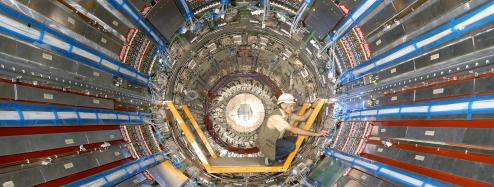
Can you imagine a stack of data DVDs almost one kilometer high? This is how much data the ATLAS project will collect each year. To gear up for the data deluge, scientists are gathering in North America for the last time to prepare for the first data to come from ATLAS later this year. The ATLAS Physics Workshop of the Americas will be held June 16 to 18, 2008 at Simon Fraser University (SFU).
Scientists involved with the ATLAS detector are eagerly anticipating the moment when the Large Hadron Collider (LHC) will begin to smash particles into each other. From the LHC’s 27 kilometer ring located beneath the Franco-Swiss border, a flood of data will rush into ten ATLAS Tier-1 centres around the world; one of them is at TRIUMF. Over 100 participants are planning to gather at SFU to discuss the status of the ATLAS detector, how to calibrate it, methods used to extract the first results, and to confer on plans for how to manage data analysis.
After more than 15 years of planning and building, they are finally ready to collect first data. “This is one of the last big working meetings for North Americans.” says Mike Vetterli of SFU and TRIUMF, who is the computing coordinator for ATLAS-Canada, and chair of the SFU conference. “We plan to update everyone on the status of the detector, the computing, and the schedule for first beam.” For Reda Tafirout, site manager of TRIUMF’s ATLAS Tier-1 Data Centre and conference presenter, “this workshop is to see where we are at. We’ll get the full status of the experiment and find out if we are ready with the computer and analysis tools before the data starts coming.” At the conference Tafirout will talk about the type of data to be collected and the role of the Tier-1 and Tier-2 computing centres.
To learn how to analyze the massive amount of data coming from the LHC, the scientists will attend a tutorial session led in part by Rod Walker of TRIUMF. At the session they will learn how to use the computing grid and ATLAS analysis tools for extraction of results. They will use simulated pseudo-data, but next time they do this exercise, it will be with real data – my advice would be not to skip this class!
Tours of TRIUMF and the laboratory’s Tier-1 data centre will be made available to the conference’s participants on June 19. Scientists come from Canada, the USA, Switzerland, France, and Argentina to participate in this exciting experience.
For more information on the conference, please visit the meeting web site.
By Nicole Dublanko
TRIUMF's Communications Asssistant
